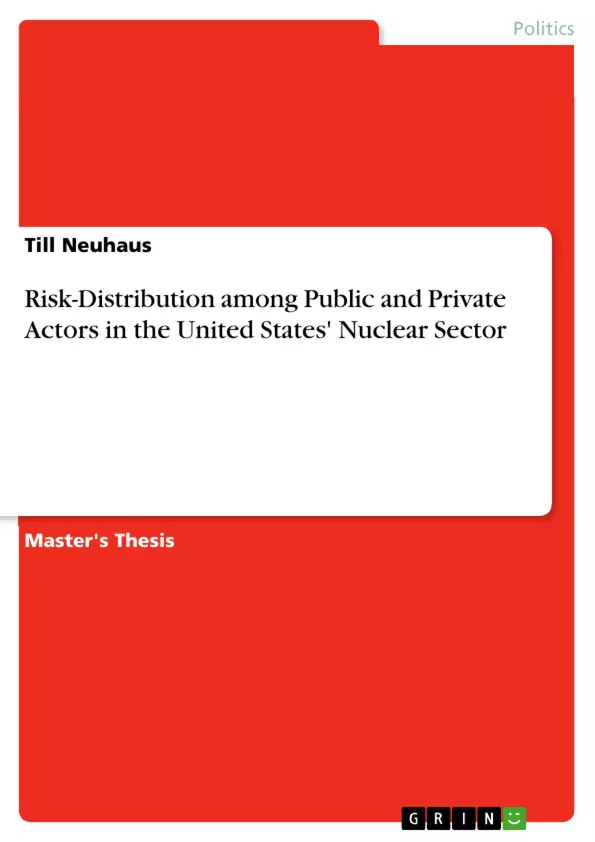
Risk-Distribution among Public and Private Actors in the United States' Nuclear Sector
Masterarbeit, 2018
98 Seiten, Note: 2.0
Leseprobe
Inhaltsverzeichnis (Table of Contents)
- Introduction
- The Changing Nature of Risk
- The Production of Nuclear Energy
- Potential Risks before, during, and after the Production of Nuclear Energy
- Risk-Assessment of Nuclear Energy and its Limits
- How to Regulate Risks caused by Nuclear Energy?
- The Role of Nuclear Energy in the United States
- A Short History of Nuclear Energy in the United States
- Geopolitics and Nuclear Energy
- The Economic Aspects of Nuclear Energy
- The Entanglement of Private Enterprises and the U.S. Government
- The AEC and the JCAE
- The NRC and ERDA/Department of Energy
- Regulations and Subsidies
- Construction and Operating
- The Early Phase of Nuclear Energy/The Light Water Reactor (1946-1963)
- Commercialization Phase of the LWR/Development of the HTGR
- The Liquid Metal Fast Breeder Reactor (LMFBR) and the Decay of the Nuclear Industry in the United States
- The Failed Renaissance of Nuclear Energy in the United States
- Summary of Research, Construction, and Operation
- The Fuel Cycle
- Uranium Mining
- Enrichment
- Reprocessing
- Waste Disposal
- Summary of the Fuel Cycle
- External Threats
- Terror Scenarios involving Fissile Materials
- Reactor Site Safety
- Cyber-terrorism
- Summary of External Threats
- Construction and Operating
- Conclusion: Tendencies in Risk Distribution concerning Nuclear Matters
- The Future of Nuclear Energy and Potential Future Research
Zielsetzung und Themenschwerpunkte (Objectives and Key Themes)
This work examines the distribution of risks associated with nuclear energy, particularly in the United States. It aims to determine when specific risks were perceived as relevant by policymakers and industry stakeholders, and whether any shifts in this perception occurred. Additionally, the study investigates the roles of public and private actors in covering these risks.
- The changing nature of risk perception in the context of nuclear energy
- The evolution of risk assessment and regulation in the nuclear industry
- The historical and ongoing entanglement of private enterprises and government agencies in the development and management of nuclear energy
- The distribution of risks among public and private actors in various aspects of the nuclear energy lifecycle, including research, development, construction, operation, and waste management
- The challenges and opportunities presented by potential future research in the field of nuclear matters
Zusammenfassung der Kapitel (Chapter Summaries)
The introduction outlines the central questions of this study, focusing on the historical evolution of risk perception and the allocation of risk responsibility between public and private entities in the nuclear sector.
The second chapter delves into the changing nature of risk, examining its transformation from a natural phenomenon to a technological and hybrid threat. The chapter explores the risks associated with the production of nuclear energy, analyzes the limitations of traditional risk assessment methods, and introduces risk-based regulation as a theoretical framework for this study.
The third chapter focuses on the significance of nuclear energy in the United States, providing a brief historical overview, exploring geopolitical implications, and examining the economic aspects of nuclear energy.
Chapter four delves into the intertwined relationship between private enterprises and government agencies in the nuclear sector, tracing the evolution of regulatory organizations from the Atomic Energy Commission (AEC) and Joint Committee on Atomic Energy (JCAE) to the Nuclear Regulatory Commission (NRC) and Department of Energy.
Chapter five, the main part of the work, examines the distribution of risks among private and public actors in different fields of nuclear energy. This chapter is divided into three sections: the research, development, construction, and operation of reactors; the nuclear supporting industry (mining, enrichment, reprocessing, and waste storage); and security issues related to nuclear power plants.
Schlüsselwörter (Keywords)
The study focuses on the key themes of risk perception, risk assessment, risk-based regulation, nuclear energy, nuclear technology, public-private partnerships, government regulation, industry responsibility, and risk distribution.
Details
- Titel
- Risk-Distribution among Public and Private Actors in the United States' Nuclear Sector
- Note
- 2.0
- Autor
- Till Neuhaus (Autor:in)
- Erscheinungsjahr
- 2018
- Seiten
- 98
- Katalognummer
- V470715
- ISBN (eBook)
- 9783668961128
- ISBN (Buch)
- 9783668961135
- Sprache
- Englisch
- Schlagworte
- Nuclear Energy Atomenergie Risiko Terror Public Private
- Produktsicherheit
- GRIN Publishing GmbH
- Preis (Ebook)
- US$ 39,99
- Preis (Book)
- US$ 50,99
- Arbeit zitieren
- Till Neuhaus (Autor:in), 2018, Risk-Distribution among Public and Private Actors in the United States' Nuclear Sector, München, Page::Imprint:: GRINVerlagOHG, https://www.diplomarbeiten24.de/document/470715
- Autor werden
- Ihre Optionen
- Vertriebskanäle
- Premium Services
- Autorenprofil
- Textarten und Formate
- Services für Verlage, Hochschulen, Unternehmen

- © GRIN Publishing GmbH.
- Alle Inhalte urheberrechtlich geschützt. Kopieren und verbreiten untersagt.
- info@grin.com
- AGB
- Open Publishing
Der GRIN Verlag hat sich seit 1998 auf die Veröffentlichung akademischer eBooks und Bücher spezialisiert. Der GRIN Verlag steht damit als erstes Unternehmen für User Generated Quality Content. Die Verlagsseiten GRIN.com, Hausarbeiten.de und Diplomarbeiten24 bieten für Hochschullehrer, Absolventen und Studenten die ideale Plattform, wissenschaftliche Texte wie Hausarbeiten, Referate, Bachelorarbeiten, Masterarbeiten, Diplomarbeiten, Dissertationen und wissenschaftliche Aufsätze einem breiten Publikum zu präsentieren.
Kostenfreie Veröffentlichung: Hausarbeit, Bachelorarbeit, Diplomarbeit, Dissertation, Masterarbeit, Interpretation oder Referat jetzt veröffentlichen!
- GRIN Verlag GmbH
-
- Nymphenburger Str. 86
- 80636
- Munich, Deutschland
- +49 89-550559-0
- +49 89-550559-10
- info@grin.com
-









